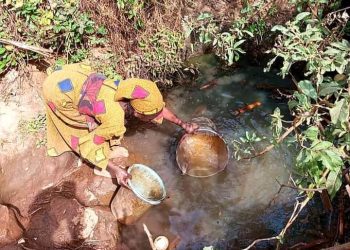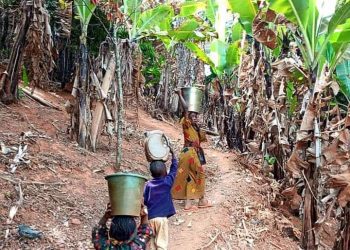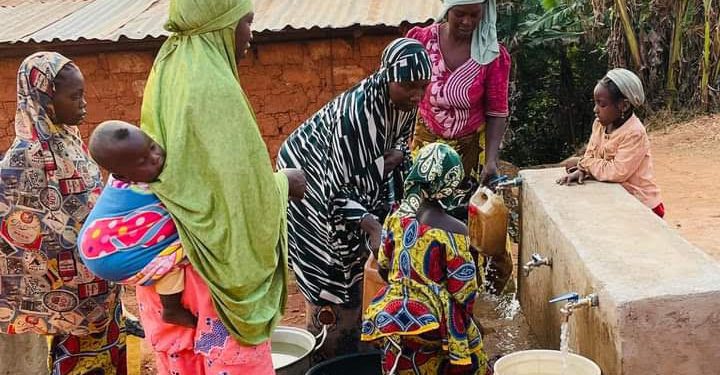The lack of sustainable and equitable access to safe water in Nigeria is a major challenge that affects the health and well-being of the population. According to UNICEF, more than 86 percent of Nigerians lack access to a safely managed drinking water source, which puts the population at risk of waterborne diseases.
Kabri-Chana is a community in Mambilla Sardauna Local government of Taraba state and it is heavily affected by this issue, as people in the rural area would have to trek long distances to collect water from streams that are often contaminated.
This, evidently, puts people at risk of contracting fatal waterborne diseases. Moreover, the community relies on ponds of stagnant and stream water for household purposes such as washing, drinking and cooking. This, experts said, is not safe and poses a serious health hazard.
However, in a remarkable endeavour to overcome this challenge, Rural Health Mission (RHM) Nigeria executed a pioneering water project in the country. This groundbreaking initiative has shattered barriers to clean water access, catalysing transformative changes in the health and livelihoods of its residents.
It is on record that many have suffered severe health issues due to the shortage in water sources, causing significant harm particularly to children and the elderly.
RHM is a non-profit organisation dedicated to enhancing healthcare in underserved areas. It embarked on a mission to bring clean water to the Kabari-Chana community in an innovative and sustainable way, through a collaboration with local stakeholders and international donors.
The Executive Director of the Mission in Nigeria Muhammed Ahmed Sadiq said the project tagged: WaterIsHealth, and supported by the World Connect constructed a solar-powered water supply system for the Kabri-Chana community. The water source was connected to surface tanks which currently distribute water to over 30 households in the community, as well as a healthy facility.
To make it even safer, the water is pretreated in the well with purification chemicals before it is discharged to the tank for onward supply to fetching points.
Similarly, the Project Lead of WaterIsHealth, Musa Mohammed, said the initiative had provided a sustainable water supply system, and with the involvement of the local community in the operation and maintenance of the facilities, it will be sustainable in the long run.
“The community engagement in the project is to ensure and foster a sense of ownership and investment in the system, which can lead to better long-term outcomes.
“The solutions offer a new and innovative approach to providing a sustainable and reliable source of clean water to a community in dire need,” said the project lead.

Community leaders applaud the initiative
Speaking to BONews on the positive ripple effects of the project, Musa Jonathan, who resides in the community, said the benefits of the initiative extended beyond improvements in health.
“The Economic opportunities have flourished as community members can now utilise the time and energy previously spent on water collection for a more productive endeavour.
“The project has also spurred educational advancements, with increased school attendance and improved educational outcomes among children who previously struggled due to water-related responsibilities, ” said Jonathan, who is an economist and educationist.
Haruna Lawan is a community leader, who said the project has improved access to clean water and reduced the burden of water collection on community members, especially women and children.
Speaking in the same vein, Mrs Fatima Abdullahi said the project empowered women and improved their livelihoods as residents in the area.
“The water project has brought a significant transformation to our lives, especially women. Previously, we had to walk long distances to fetch water, which consumed a considerable amount of time and energy.
“The project has alleviated that burden by providing clean water right in our community. Now, we can devote more time to other activities, such as income-generating work or taking care of our families.
“It has empowered us to pursue economic opportunities and enhance our livelihoods,” she said.
To Miss Aisha Bello, the intervention also spoke on the initiative and how the availability of clean water through the solar-powered water project is aiding access to education in the Kabri-Chana community. She stated that the project has had a direct impact on the education of young women in the area.
“Previously, children, especially girls, were burdened with the task of fetching water. This often resulted in absenteeism from school or poor academic performance.
“With the solar-powered water project, the availability of clean water within our community has reduced the time spent on water collection, allowing children to attend school regularly and focus on their studies.
“It has opened up new opportunities for us to gain knowledge and build a brighter future,” she said.
The success of the RHM’s water project in the community has garnered attention and commendation both locally and internationally. It serves as a powerful example of how innovative and sustainable solutions can break down barriers to health and well-being in marginalized communities.
There is renewed hope that universal access to clean water can become a reality, positively transforming countless lives and fostering sustainable development.
Religious leader, Musa Usama said the impact of the project on the Kabri-Chana community, stating that the project had been truly transformative.
“Previously burdened with the arduous task of fetching water from distant and unreliable sources, community members now have convenient access to a consistent supply of safe drinking water within their vicinity.
“This development has alleviated the physical strain and time constraints placed on women and children, liberating them to engage in education and income-generating activities,” Usama said.

The intervention has reduced waterborne diseases – residents
Mrs. Mairo Musa, commenting on the project, stated that since its execution, they had noticed a significant reduction in water-related illnesses among community members, especially children.
“Before, cases of diarrhoea and waterborne diseases were common, but now they have drastically decreased. We are grateful to the RHMN for its tireless efforts in providing us with clean and safe water, which has positively impacted our health and overall quality of life,” she said.
For Mr. Ibrahim Yahaya, another resident of the benefitting community, said the intervention was transformative. The community, he said, previously relied on unsafe water sources, hindering their development. The provision of clean water, according to him, has brought about improvements in agricultural productivity and economic opportunities for the residents.
“With clean water readily available, we have been able to establish community gardens, which not only provide fresh produce for our families but also serve as a source of income. The water project has truly been transformative, fostering progress in our Kabri-Chana community,” he asserted.
Medical health personnel react to the Initiative
Meanwhile, community health practitioners in the community have laid credence to the impact of the initiative as well.
“Before the project, waterborne diseases were prevalent due to the lack of clean water sources. Cases of cholera and diarrhoea were frequent, particularly among children. With the introduction of the water project, we now have access to safe drinking water, and the incidence of waterborne diseases has significantly decreased,” said Umar Isa, a community health personnel.
He explained that the improved hygiene practices had been encouraged within the community now that water supply is available. Overall, this project has brought a positive change in our health and well-being.
Another Medical personnel, Ahmed Isa commented that water-borne diseases such as cholera, and diarrhea have reduced with basic sanitation and hygiene improving.
Mr. Musa Haruna a Primary School Teacher and resident of the Kabri community on the availability of clean water and its contribution to the overall health and hygiene of the Kabri-Chana community.
“With improved health, increased economic opportunities, and better educational prospects, the water project has set us on a path towards long-term development and a brighter future for the community,” he said.
The initiative still faces Challenges
Though the project is laudable, it is not without its limitations and challenges. The Executive Director of the RHM identified resources as one of the challenges the organisation wants to reach the whole LGAs with over 200 communities facing similar problems. However, the organisation leadership is determined to reach one community at a time.
“There is a need for resource mobilisation to enable the initiative to expand this intervention to more communities and hope to support ten more communities in the next 10 months who are facing similar challenges,” he said.
This story has been made possible by Nigeria Health Watch with support from the Solutions Journalism Network, a nonprofit organization dedicated to rigorous and compelling reporting about responses to social problems.

